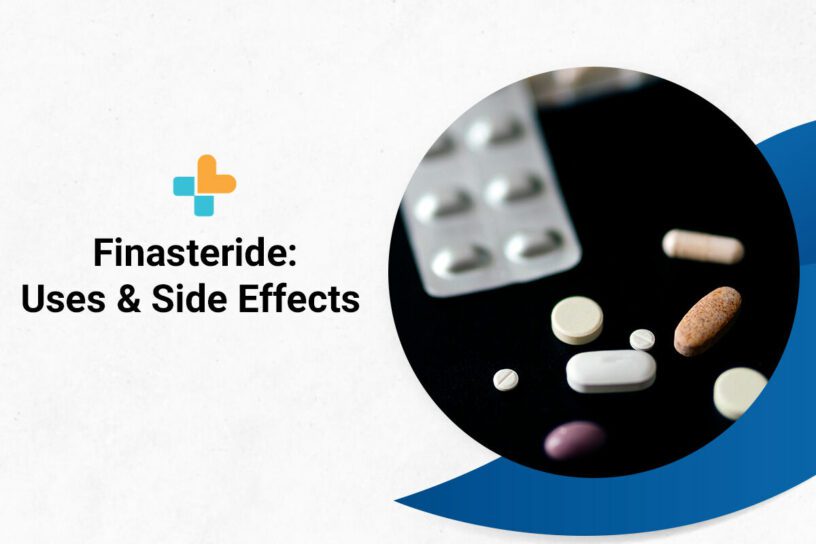Modern medicine is known to work wonders; it has cured numerous people and helped millions more. But, in some cases, these very life-saving drugs, when consumed incorrectly, could cause a number of side effects and even be fatal.
Hence, it’s crucial that you know what the medications you take do to your body and the key aspects of how they work. Some medicines, for example, can have serious side effects when combined with particular foods, other medications, or even nutritional supplements. Take some time to educate yourself on the treatment prescribed to you before you begin to consume it.
In light of this, we will discuss a common medication recommended for men called finasteride and how it works. We will also assess finasteride side effects in men.
What is Finasteride?
Finasteride is a steroid-like drug used to treat male pattern baldness and Benign Prostatic Hyperplasia (BPH/enlarged prostate). It can be used alone or in combination with other drugs to alleviate BPH symptoms and possibly avoid surgery.
Finasteride helps BPH symptoms by reducing the need to urinate, improving urine flow with less straining, reducing the sense that the bladder isn’t totally empty, and reducing overnight urination. In addition, this drug also lowers the quantity of DHT, a hormone that drives prostate growth.
How to use Finasteride
Finasteride is taken orally once a day, with or without food. As per your doctor’s instructions. To get the most benefit from this drug, take it on a daily basis. It’s important to remember to use it at the same time every day. Do not stop using this drug without first consulting your doctor. It could take 6 to 12 months for you to start to observe a difference.
Side effects of Finasteride
Finasteride, like all drugs, can cause side effects in some people, however, not everyone experiences them. Some of the common side effects that are noticed in more than 1 in every 100 people who consume the medication are as follows –
- Trouble getting an erection and a lack of desire to have sex
- Issues with ejaculating, such as a lack of or inability to ejaculate
- Dizziness
- Headache
- Weakness

These side effects go away after a while. However, if they persist for a very long time, talk to your doctor or pharmacist about it.
Some of the more serious side effects of finasteride observed in less than 1 in every 1,000 people are as follows –
- Any lumps, soreness, swelling in your chest, or discharge from your nipples. This also indicated that the patient might have breast cancer.
- Low mood (depression) and/or thoughts of self-harm
- Blood in your semen
- Pain in your testicles
- Allergic reactions such as anaphylaxis
Besides the allergic reactions, other side effects like finasteride induced erectile dysfunction appear after a few months. These usually resolve on their own, but if it doesn’t, consult your doctor immediately.
Important facts to remember
- Tell your doctor or pharmacist about your medical history, especially if you have liver disease, prostate cancer, infections, or urinary issues, before using this medication.
- Do not handle crushed or broken finasteride tablets if you are pregnant or attempting to conceive. The drug can enter through your skin and harm your baby.
- Keep this medicine away from moisture, heat, and light at room temperature. When not in use, keep the tablets in their original container, well closed.
- Keep a documented note of all the prescription and nonprescription (over-the-counter) medications you’re taking, as well as any vitamins, minerals, or other dietary supplements you’re taking, to show your doctor.
- If someone has overdosed and has serious symptoms such as passing out or trouble breathing take them to the nearest hospital immediately.
Frequently Asked Questions
Only a small number of men who use finasteride report any side effects. Other side effects are possible but are uncommon, and usually go away once the medication is stopped.
No, they are not permanent. The side effects should stop when you stop taking the medication.
No, rather it inhibits the conversion of testosterone to dihydrotestosterone ? a hormone responsible for prostate gland enlargement.
Yes, erectile dysfunction, male infertility, ejaculatory dysfunction, and loss of libido are some of the side effects of finasteride.
The dosage has a big impact on the number and severity of side effects. You should take the lowest dose possible to reduce the severity of side effects. Besides that, you can avoid side effects during the day by taking the medication before bed.
How common are the side effects of finasteride?
Only a small number of men who use finasteride report any side effects. Other side effects are possible but are uncommon, and usually go away once the medication is stopped.
Are finasteride side effects permanent?
No, they are not permanent. The side effects should stop when you stop taking the medication.
Does finasteride lower testosterone?
No, rather it inhibits the conversion of testosterone to dihydrotestosterone ? a hormone responsible for prostate gland enlargement.
Can finasteride cause erectile dysfunction?
Yes, erectile dysfunction, male infertility, ejaculatory dysfunction, and loss of libido are some of the side effects of finasteride.
How to reduce side effects of finasteride?
The dosage has a big impact on the number and severity of side effects. You should take the lowest dose possible to reduce the severity of side effects. Besides that, you can avoid side effects during the day by taking the medication before bed.
Furthermore, the effects of finasteride differ from person to person, based on their health, medical history, and other factors. If you’ve been prescribed this drug but are unsure whether or not to take it, get on a call with one of our specialist doctors atAyu Health to obtain a full explanation of the prescription and how it may affect your health. Ayu Health can provide quality healthcare at affordable prices. Contact 636-610-0800 to book an appointment now.
Our Hospital Locations
General Surgery Hospitals in Chandigarh | General Surgery Hospitals in Bangalore | General Surgery Hospitals in Jaipur | General Surgery Hospitals in NCR | General Surgery Hospitals in Hyderabad
Our Doctors
General Surgery Doctors in Chandigarh | General Surgery Doctors in Bangalore | General Surgery Doctors in Jaipur | General Surgery Doctors in NCR | General Surgery Doctors in Hyderabad
About the Author

Dr. Rachana Shilpakar
Dr. Rachana Shilpakar is a renowned Dermatologist currently practicing at Ayu Health, Bangalore.
Dr. Rachana Shilpakar is a dermatologist with over 12 years of experience in the field. She has experience in clinical & aesthetic dermatology & she is well versed with all procedures & lasers. She is specialized surgeon in Dermatology




